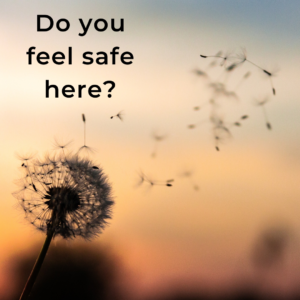That does it mean to feel safe at work? That is a loaded question. Are we talking about physical safety? Emotional safety? Psychological safety? To me, feeling safe at work includes anything that may make us feel threatened in any way, from unsafe equipment to bullying to discrimination (yes, this is only a partial list).
It all starts with getting hired to do a job. While the employer hired us knowing we can come in and be successful in our new role, we, as an employee, go to work knowing we will feel safe. Or, at least we assume we will feel safe.
But…What if you don’t feel safe?
Organizations, leaders, HR and safety professionals constantly tell us: If you see something, say something. If you see something that may be a hazard, report it. Seeing a a co-worker being bullied, should be reported. If you witness an act of discrimination, say something.
The same group: organizations, leaders, HR and safety professionals tell us we can report anything without fear of retaliation. If you see something, say something. It is for the safety and well-being of all employees.
All of this is great. Yes, employers must say all of these things. Honestly, I think employers, for the most part, truly mean it. They want to protect the workforce from any and all unsafe acts.
What employers don’t realize is, regardless of what we are told, we don’t feel safe reporting “unsafe” acts. This is a trust issue. Reporting a safety issue as related to physical safety is less intimidating to report. It is easy to defend. It is easy to prove. An issue that is physically unsafe is visual. The problem is identified. A solution is created. The problem is solved.
However, with acts of discrimination, bullying or harassment, things become a little cloudy. The what-ifs begin to surface.
- What if no one believes me?
- What if I lose my job?
- He/She is a manager, nothing will get done about it.
So how do we do better? How do we make it possible for employees to report an incident when they feel unsafe? What can we do to provide a safe workplace for all?
It is a culture shift and it has to start at the top. Employees must have trust in their leadership. Providing safety, in any and all areas starts and ends with accountability and exceptional leadership.
There’s that word again. Accountability. For accountability to mean something, it has to be consistently enforced. That begins with organizational accountability. Organizational accountability is ensuring the org acts in the best interest of the business and all employees. Not one or the other, but both.
Organizational accountability is a top-down framework and it is ineffective when anyone within the org is permitted given special treatment. No one can be exempt.
An accountable organization will address issues of safety, regardless of the type of safety issue. They will listen, investigate and determine the appropriate action. They will execute the action, regardless of the parties invovled. No employee is exempt from doing there part in creating a safe work space.
The same goes for effective leadership. They will listen to understand, assess, investigate and act with an appropriate and consistent resolution.
I can hear all of you now…yeah right, sure they will.
As employees we can only hope our leaders and orgs will do the right things. We have to give them a chance to do the right thing. In order for employees to report issues they must:
- Know they are free from backlash or retaliation.
- Know the issue will be addressed.
Additionally, there is accountability on the part of the employee. Employers cannot address issues they don’t know about. As an employee, do your part. Report it. If you see something, say something. If no one listens, find someone who will. Don’t stop making noise until the issue is resolved.
Orgs and leaders that consistently do the right thing will build an organizationally accountable workplace. As they continue to address issues in a consistent manner, they will slowly build trust and ultimately an accountable workplace that is “safe” for employees.
Keep your employers and yourself accountable to build safe workspaces.

